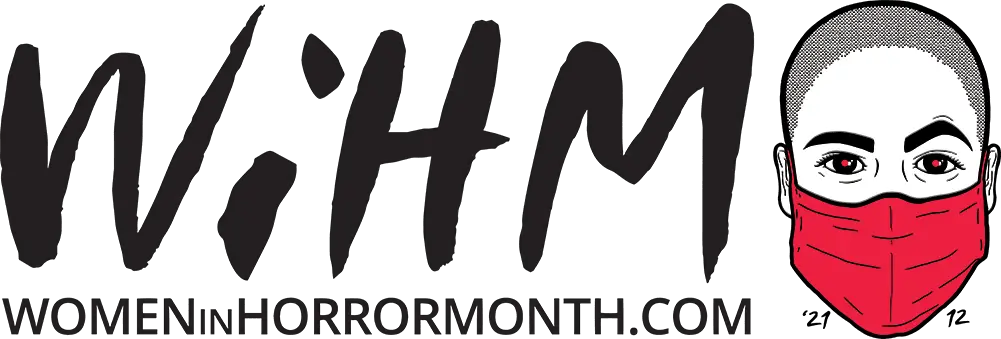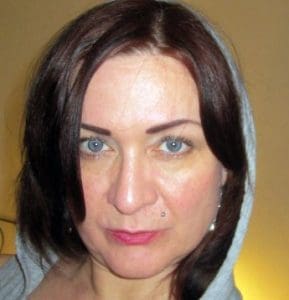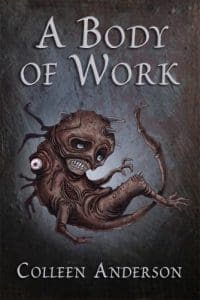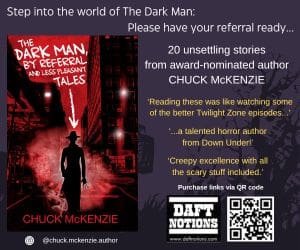WiHM 12: Quick Six Questions With Colleen Anderson

Welcome to The Horror Tree, and thank you for participating in Women In Horror Month. First, tell us a bit about yourself and your interest in horror.
 Horror happened naturally for me, and was unintentional. In a chaotic home life, my mother would take me and my little brother to drive-in movies to escape my father’s drunken ways. In jammies, tucked into the back of a station wagon, at the ripe age of 6 or 7, I watched Vincent Price movies with gushing blood and gothic overtones. I’ve conflated Fall of the House of Usher and The House of Seven Gables into one but I believe it was the latter that first imprinted me.
Horror happened naturally for me, and was unintentional. In a chaotic home life, my mother would take me and my little brother to drive-in movies to escape my father’s drunken ways. In jammies, tucked into the back of a station wagon, at the ripe age of 6 or 7, I watched Vincent Price movies with gushing blood and gothic overtones. I’ve conflated Fall of the House of Usher and The House of Seven Gables into one but I believe it was the latter that first imprinted me.
Then I was reading Edgar Allen Poe and Ray Bradbury in my pre-teens, and watching Twilight Zone, and reading my older brother’s abandoned SF novels. That, coupled with a tormented childhood, left a residue. I didn’t seek horror per se, but it was already stalking me. When I started writing, I sold a few pieces but was sending out what I thought was a perfectly good fantasy piece and being rejected with notes that “we don’t do horror.”
When I realized that I sold better the darker I went, I then dove into the deep dark end, where tentacles and slow-moving dread lived. I guess it was natural all along, although it took a while for me to know it.
Why is Women In Horror Month important, and what do you say to someone who says ‘Oh, I don’t care if it’s by a man, a woman, etc., as long as it’s a good story’?”
I’ll answer in reverse. I say good! Because as long as we say, “Oh that’s by a gay author, or a person of colour, or a woman, or an aardvark, it means we are judging the story by the author and our preconceived notions of what those descriptors mean, and that we are then not judging (or accepting) the story for its tale only. Whoever writes a story shouldn’t flavour what the story is about, as long as the research or the worldbuilding excels. I am not so naïve as to think that our experiences don’t affect our writing if we are writing about those experiences, but a good writer can transcend their world. And don’t forget, if you’re writing about three-foot-high snake people who sing the flowers asleep and cultivate jelly beans that birth cities, well, there is no one on earth who has had that experience. We might think a story is better if it’s about a woman and written by a woman or not as good if it’s about a African man but written by a white woman, but all fiction is just that, fiction and speculative, even if set in the modern world. A great story should transcend the author. If we read 100 stories without knowing anything of the author, would we then judge the stories as being as good or as bad as we would if we knew the author’s gender/race/religion/political views?
And is Women in Horror Month important? As long as we have to ask, as long as there is wage disparity between genders for the same job, as long as there is more violence against women than men (not that violence against either is right), as long as there is discrimination in any profession, then yes, we need a focus on women in horror, but not at the expense of other groups, even including men. And as long as we have the overdone tropes of women as victim, seducer, harlot, virgin, then yes, we need it. I’d say it’s getting better, and it is, but we have to remember that we in North America are not all of the world and that even here, and beyond, there are women enslaved, subjugated and brutally abused. This is why it’s important.
Who are some Women In Horror (or other women) who have influenced your work, and why?
This would change day by day. Currently, Rena Mason, Gemma Files, Christina Sng. Ursula Le Guin was mighty and a fierce intelligence. We are poorer for her having left it. Tanith Lee; I met her briefly through a friend about a year before she died. I was oddly moved by her passing, and I’d once been compared to her style though I’m sure I was but a ghost to her writing might.
2020 will probably be remembered as a TERRIBLE year for many of us; tell me something GOOD that happened in the past 12 months.
I wrote and sold more poetry than ever before, and I was nominated for a Pushcart Prize, which has not happened before. Like many people, I saved a lot more money because there was nothing to do. Oddly I think it’s good that for once the world as a whole is truly a global village and that we are all experiencing the same pandemic—the great leveler. The isolation has also shown me how much interactions with people are vital to my wellbeing. I always knew it but I hurt on such a deep level with connections to humanity, and while I’ve never been a fan of the howling void of Lovecraft’s world, I’m skimming the rim of it now.
What have you got planned for Women in Horror Month, and the coming months of 2021?
I’m trying to post a few women up on my blog, which languishes too much. So maybe I’ll write in my blog more often. ybe I’ll try The coming months will see me pushing to finish several dystopian SF stories that will form a mosaic novel. Let’s say an unnamed disease and climate disaster is the backdrop for my world. And as always I will continue writing, and work at seeing a couple of poetry manuscripts get to print, one way or another.
Is there anything else you’d like to tell our readers? Thanks for participating in Women in Horror Month!
 Horror is not what you think. Sure there is gorefest monster slasher slaying victims films, but many speak on a deeper level, allowing us to see our fears from a distance and come to terms with them. We can look at that bizarre roller coaster of terror and think, My life isn’t so bad. The best way to be introduced to horror with it less in your face is to read a story or even a poem. Though it might still get in your head. Thanks for this opportunity.
Horror is not what you think. Sure there is gorefest monster slasher slaying victims films, but many speak on a deeper level, allowing us to see our fears from a distance and come to terms with them. We can look at that bizarre roller coaster of terror and think, My life isn’t so bad. The best way to be introduced to horror with it less in your face is to read a story or even a poem. Though it might still get in your head. Thanks for this opportunity.
Bio:
Colleen Anderson’s writing has appeared in numerous fiction and poetry venues such as nEvermore!, Beauty of Death, Amazing, Heroic Fantasy Quarterly and Cemetery Dance. A three-time Aurora nominee, she has received honorable mentions for poetry and fiction. Her past includes book buyer, book rep, poetry editor, reading series host, anthology editor, as well as freelance copyeditor. She has received a Canada Council and BC Art’s Council grant for writing, and was nominated for a Pushcart Prize. Black Shuck Books, UK published her dark fiction collection A Body of Work. She has also edited three anthologies.
You can follow Colleen on her homepage.
- About the Author
- Latest Posts
Selene MacLeod is a night operator and sometime writing hobbyist. She holds a BA in Communications from Wilfrid Laurier University and resides in Kitchener, Ontario. Her work has appeared in several horror and crime fiction anthologies, most recently Shotgun Honey, Drag Noir (Fox Spirit Books); and the upcoming Freakshow: Freakishly Fascinating Tales of Mystery and Suspense (Copper Pen Press), and Tragedy Queens (Clash Media).She’s most excited about editing a charity anthology for Nocturnicorn Books called Anthem: A Tribute to Leonard Cohen, due out late 2017.











Wow, a meeting with Tanith Lee…